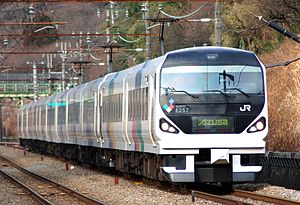This article has multiple issues. Please help improve it or discuss these issues on the talk page. (Learn how and when to remove these messages)
|
| E257 series | |
|---|---|
 An E257-0 series train on a Chuo Line Azusa service in January 2008 | |
| In service | 2001–present |
| Manufacturer | Hitachi, Kinki Sharyo, and Tokyu Car Corporation |
| Family name | A-train[citation needed] |
| Replaced | |
| Entered service | 1 December 2001 |
| Refurbished | 2019– |
| Number built | 249 vehicles (5 × 2-car, 19 × 5-car, 16 × 9-car) |
| Number in service | 239 vehicles |
| Number scrapped | 10 vehicles (5 sets) |
| Successor | E353 series (Azusa, Kaiji) |
| Formation | 5/9 cars per trainset Formerly: 2 cars per trainset |
| Operators | JR East |
| Depots | Matsumoto, Makuhari, Omiya |
| Lines served | E257-0 (2001–2019):
|
| Specifications | |
| Car length | 21.000 m (68 ft 10.8 in) (end cars) 20.500 m (67 ft 3.1 in) (intermediate cars) |
| Doors | 2 per side |
| Maximum speed | 130 km/h (81 mph) |
| Traction system | IGBT–VVVF (Mitsubishi Electric) |
| Traction motors | 3-phase AC squirrel-cage induction motors (Mitsubishi Electric) |
| Acceleration | 0.56 m/s2 (1.3 mph/s) |
| Deceleration | 1.4 m/s2 (3.1 mph/s) |
| Electric system(s) | 1,500 V DC overhead catenary |
| Current collector(s) | Pantograph |
| Braking system(s) | Regenerative brake, electronically controlled pneumatic brakes, snow-resistant brake |
| Safety system(s) | ATS-SN, ATS-P |
| Track gauge | 1,067 mm (3 ft 6 in) |
| Notes/references | |
This train won the 45th Blue Ribbon Award in 2002. | |
The E257 series (E257系, E257-kei) is a DC electric multiple unit (EMU) train type operated in Japan for limited express services by East Japan Railway Company (JR East) and built jointly by Hitachi, Kinki Sharyo, and Tokyu Car Corporation.